INDUSTRY IN ENGLAND.*
Mn. DE B. GIBBINS, as the title-page to his present work indi- cates, has extended his studies very far beyond the "problem of the unemployed," and has given us a book of very copious and well-digested facts and thought. His maps supply very fair material for the formation of reasonable ideas of England at various periods of her history, from times long prior to the period of the Domesday Book to times long subsequent to the settlement of the cardinal features of her constitutional as well as her industrial history. His tables place before the reader in a convenient form some of the vast changes in population, in local trades, and in the general trade of the country, and the comparisons are not in any noticeable case overdrawn. The plan of the work is not, we grant, over- elastic, but such as it is the author has made the best of it, and produced at once a pleasantly written and a very suggestive book.
We question whether he is right to the full extent which he seems to claim in his delineation of village communities and crafts. Some of his remarks on this wide subject might have formed part of Sir Henry Maine's great work on "Village Communities in India," but we question whether any English example forms a parallel to Indian work in any sense that can be taken at once as accurate and representative. The English workman and workwoman, whether part of a trade community or not, had methods all their own, and no more approachable by Eastern workmen or workwomen than these men or women could themselves be approached in their re- markable efficiency and the perfection of their particular work. In the same way the village crafts in England, taking the term "England" in its application to Great Britain, certainly depended on localities. As the Celt is before any- thing else a man of combinations for trade or other purposes, so the Saxon is a man who very often laughs combinations to scorn, and would rather fall, by himself, than succeed in a "grand company." In some respects this, perhaps, is his mis- fortune; but he would not give up the " right " for anything • Industra in E141.1.4 : Ristomal Outlines. By H. de B. Gibbing, ILA. With Naps. Tables, and a Plan. London: Methuen and Co. that could be offered to him in exchange for it. Thus, we think, the village crafts were incomparably more powerful in Wales, Scotland, and Ireland than in England. We have seen an Irish community "settle" in a thoroughly English part of England, with looms and other apparatus of weaving, and thereupon form a community of weavers, to the infinite indignation, but beyond the reach, of the English weavers by whom they were surrounded. The Irish workmen, in one ease which we well remember, were never beaten from their position. They had their own customs as compact as the same customs had been in Ireland itself, even to the village ale-house, and to the free-hand fights with which Patrick and Barney loved to round off their week's work ; and if they next day attended their chapel to a man, why, their devotions were probably quite as real as, at least, those of their English friends. They were strangers in a strange land. They were- a village community.
On the subject of village similarities and peculiarities Mr. Gibbing gives a couple of pertinent illustrations contrast- ing a village in Hampshire (as pictured by the late Pro- fessor Thorold Rogers) with one in the North of England (as pictured by a North of England man). The illustrations might be greatly extended by persons whose memories carry them back over, say, even sixty or seventy years, and there- in reaching other memories, open up views of "old times.' In the Hampshire village the labourers baked their own bread, brewed their own beer, kept pigs and poultry, and had half an acre or an acre of land each to till as part of their hire. In many cases the labourers, by industry, good con- duct, and good workmanship, rose to be yeomen. Such is the picture given,—not one of serfdom the reader will perceive. We can ourselves remember many scenes which recall the outlines of both illustrations, but most clearly of the one referring to the North. A Cumberland, Westmoreland, or Nor- thumberland housewife never thought of any such barbarism as buying her bread ready baked, or her beer ready brewed. Oat-bread, marvellously thin and fine, and beautifully baked, was an institution in the borderland of Lancashire and Cam- berland. The baking days were as well defined as the fair days. Thus the different races held together in times when a com- munity on the large scale of nationhood was as yet im- practicable. From these and kindred customs sprang others more important. In the borderland to which we have referred, two men—let us say of the good artisan class—each desire to build a house, but to build the two as one house, with, how- ever, the separation and privacy which an Englishman so dearly loves. All their neighbours and friends unite to help them, with willing hands and good-natured hilarity. The stone is quarried from the mountain and carted for them to. where it is wanted, the only cost to which the builders are put being a good supper, to which every evening all the workmen are welcomed. The two houses are built on a common principle. There is no quarrelling as to whether this man's joists or beams ought or ought not to be put in that man's wall. Thus was it in old industrial England. What a fund of illustration there is here for a still larger history of those grand old days !
Following Mr. Gibbing to another great branch of his subject, we are reminded that the Celt was not, as is often supposed, an aimless and inefficient agriculturist, but often very expert in that basis of so many industries. Referring to tin, the author says that, in the time of the Greek ex- plorer, Pytheas, the trade of tin manufacture, and the mer- cantile distribution of that manufacture, had grown to great. proportions, and represented what appeared to promise a. great future for that particular industry, especially in South Wales. The promise, one regrets to find, has from some cause- or other vanished, and a great part of the workmen are scattered over other lands; a decay in a sense as complete as that of the Lancashire hand-loom weaving; like it, however, remaining to point a moral in the history of English industry. Passing on, we have been tempted to refer to a trade which preceded and succeeded that of tin, and which bears on it s living history. Among a hardy race of seamen there were men who, owning their own little vessels (brigs and brigantines for the most part), carried their cargoes from the Bristol Channel, or the Solway, to every part of the Mediterranean and the West Indies, and to regions beyond,—and were often found competent to instruct Foreign Secretaries as to matters desirable for them to know concerning Copenhagen, Stock- '
holm, and Constantinople, being as modest as they were capable and brave. We know of one case in which the master and owner of one of these little vessels and his son, gallantly ran the gauntlet of the French fleets and fortifications during the great war, were caught and imprisoned for, as it turned out, a term of years, the son finally emerging from his prison a good French and Italian scholar, and able to take the command of a Mediterranean mail-vessel to which he was appointed.
We teach our children to speak with pride of the Cinque Ports and the hardy race of sailors which we poured there. from in times of national danger; and the men and the ports were alike glorious. But let us not forget those noble little vessels and ports on which we so materially depended for our race of sailors, vessels which, whether on the Irish Sea, or the North Sea, or in the English Channel, or far away in distant scenes, were of the best of England's wealth. These seamen had, indeed, to face one terror equal to that inspired by a real ghost,—the terror of the press-gang ; but apart from that their stout hearts and sturdy arms were at England's service, as in her kindly moments she well knew, and knows still.
The author of Industry in England would still point us onward, but we must pause, mindful of our large subject and our small space. Of kinship of races, and of how that kin- ship may be traced in the structure of words which speak their own origin, of our national indebtedness to Venetian commerce, and to Dutch and other kindred races, an interest- ing picture might be drawn by Mr. Gibbins. How the brave, if stolid, Dutchman vied with the light and graceful Norman, and both contributed to England's great industries, is better told in this book than could be even suggested in any review of it. Mr. Gibbins does not claim for England pre-eminence in artistic power or taste, but he does seem to show that whatever artistic fish came to England's net were secured and appropriated. Mr. Gibbins tells us vividly of the birth of the manor and of the manorial system ; of the yeomen emerging from serfdom ; of the guilds, of the fairs and markets, in each instance and in many more which rise to the memory, welling up with the life that conies of freedom.















































 Previous page
Previous page